GPS Flash Fiction?
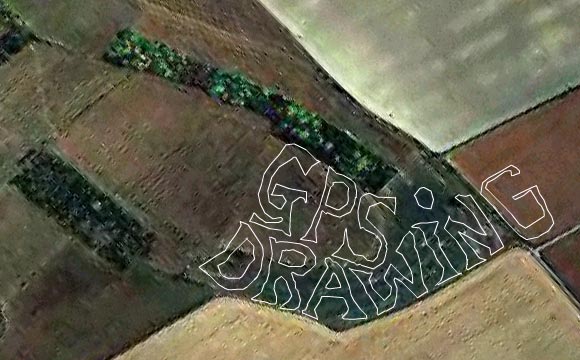 In January of 2009, this marathoner wrote a message on a map with GPS tracking software to raise funds for a small village in Uganda and posted the video on YouTube. If you can’t read it, it says “Hello I am running in the 2009 Flora London Marathon for ICYE UK; please sponsor me at justgiving.com/jennys_run.”
In January of 2009, this marathoner wrote a message on a map with GPS tracking software to raise funds for a small village in Uganda and posted the video on YouTube. If you can’t read it, it says “Hello I am running in the 2009 Flora London Marathon for ICYE UK; please sponsor me at justgiving.com/jennys_run.”
This website “investigates principles and techniques of drawing and sculpting with satellite navigation technology.”
Question: when will Sean Lovelace write a flash fiction with a GPS tracking device?
(via old NYTimes story)
Literature’s Material Circumstances
 Blake already posted about &Now, but I want to put up more about one panel titled “Writing’s Dirty Secret: An Investigation of Literature’s Material Circumstances.” This panel was run by Jeremy Davies and AD Jameson and was really interesting because it tried to get at some of the more process-based questions about writing habits. How do we write? What do we use to write? Time of day? And so on. Standard questions really, but questions that might not get the focused treatment they deserve.
Blake already posted about &Now, but I want to put up more about one panel titled “Writing’s Dirty Secret: An Investigation of Literature’s Material Circumstances.” This panel was run by Jeremy Davies and AD Jameson and was really interesting because it tried to get at some of the more process-based questions about writing habits. How do we write? What do we use to write? Time of day? And so on. Standard questions really, but questions that might not get the focused treatment they deserve.
The panel led to more discussion between Matt Kirkpatrick, Lily Hoang, and myself later that night. Lily echoed a remark that panelist Vanessa Place made: that to answer these kind of questions was somewhat frustrating because of how predictable our answers are, as the questions and our answers are so bound up in what we think a writer ought to say when asked “how do you write?” Place asked during the panel something like this: how many of our writing habits come not from what works best for us but what we think ought to work best for us based on some idealized notion we have about what it means to be a ‘writer’?
Have you ever written a story/poem/text that you thought you’d have to trash, but then ‘saved’ it somehow? If so, how?
Breyten Breytenbach: Writing as a Sense Organ
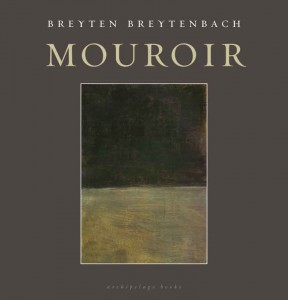
Heather Hartley: While you were in prison, you said, “writing becomes a sense organ.” How do you mean this?
Breyten Breytenbach: In prison particularly [this is the case], and I’m sure it’s probably the same if one were to find oneself in any situation of isolation. Imagine that you get lost in the high mountains or you’re sick and in hospital for a long period or that you’re going to a monastery. I think that if writing is your bent, it becomes a sense organ through which you experience or try to understand the world … I think it becomes an essential medium to access the world around you, your immediate environment and also the interaction between this, memories and imagination. It’s also a way of accessing your self.
I hadn’t been aware of the extent to which writing becomes an inevitability, becomes an actual necessity. It’s nearly as if something doesn’t really exist until I can shape it in writing or think it in writing and it’s in this way that I compare it to a sense organ. I think one becomes dependent on it in the same way as you look and listen to and interpret what you hear and what you see. In writing, which is obviously a quiet activity, [although] I’m not sure it’s a natural one, I think it does become a sense organ, yes. Probably a kind of aggregate of the others … but then perhaps none of the sense organs exist by themselves.
Editing INFINITE JEST
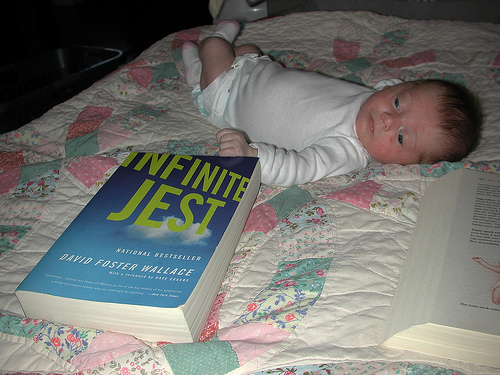 Again, some bits from the Sonora Review DFW Tribute Issue, which I’m still reading through; this time I’ve excerpted Rick Moody’s interview of Michael Pietsch, who edited Infinite Jest while at Little, Brown. The whole interview is interesting, as Pietsch talks about how he acquired IJ, how he and Wallace worked together to edit it, and how ‘it felt as if [they’d] published a book that mattered, and that would last.’ Pietsch calls it ‘one of the great thrills’ of his working life.
Again, some bits from the Sonora Review DFW Tribute Issue, which I’m still reading through; this time I’ve excerpted Rick Moody’s interview of Michael Pietsch, who edited Infinite Jest while at Little, Brown. The whole interview is interesting, as Pietsch talks about how he acquired IJ, how he and Wallace worked together to edit it, and how ‘it felt as if [they’d] published a book that mattered, and that would last.’ Pietsch calls it ‘one of the great thrills’ of his working life.
Of the editing process, Pietsch says that ‘every decision was David’s. I made suggestions and recommendations and tried to make the reasons for them as clear as possible. But every change was his.’
After the jump, you’ll find some responses Wallace made to Pietsch’s requests for cuts.
What is a happy story?
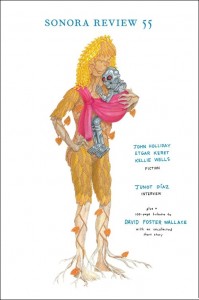 Last Tuesday afternoon, someone in my Introduction to Fiction class asked me if we would ever read a ‘happy’ story this semester, and I didn’t know how to answer. I didn’t feel comfortable saying ‘no’ or ‘yes,’ because I have a hard time understanding what is a happy story and what is a sad story. For those who don’t know, all of our readings have come from The Anchor Book of New American Short Stories, and we’re about to start reading My Happy Life by Lydia Millet for the novel portion of the course. I like to think that the kinds of things we’re reading are somewhat varied; however, another student disagreed, and criticized the selections Ben Marcus had made. The student pointed at what Marcus says in the introduction (“What I found in my reading was an amazing range of styles, beliefs, methods, ideologies, and instincts.”) and commented that despite the differences Marcus intended to show, the stories in the anthology, in the student’s opinion, are all generally sad and depressing. And if we categorize stories that way, and if we assume that we share the student’s definition of sad, then there isn’t much variety in that, right?
Last Tuesday afternoon, someone in my Introduction to Fiction class asked me if we would ever read a ‘happy’ story this semester, and I didn’t know how to answer. I didn’t feel comfortable saying ‘no’ or ‘yes,’ because I have a hard time understanding what is a happy story and what is a sad story. For those who don’t know, all of our readings have come from The Anchor Book of New American Short Stories, and we’re about to start reading My Happy Life by Lydia Millet for the novel portion of the course. I like to think that the kinds of things we’re reading are somewhat varied; however, another student disagreed, and criticized the selections Ben Marcus had made. The student pointed at what Marcus says in the introduction (“What I found in my reading was an amazing range of styles, beliefs, methods, ideologies, and instincts.”) and commented that despite the differences Marcus intended to show, the stories in the anthology, in the student’s opinion, are all generally sad and depressing. And if we categorize stories that way, and if we assume that we share the student’s definition of sad, then there isn’t much variety in that, right?
But, and this is my question, are there really happy stories and sad stories? If they exist, how do you define one or the other, or is it even a matter of one or the other?
Dispatch Thirteen: Words and Song
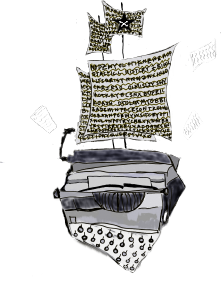 From PH Madore:
From PH Madore:
dispatch thirteen has arrived to a largely silent reception party. It is the first issue to feature a song in addition to the story. It won’t be the last. Unless something goes wrong, it’s going to be a regular feature.
Well, not quite so silent. The song is “Midnight! (I’m Not Famous Yet)” by Mike Young’s music project thing, The Cinnamon Urns.
Dispatch Thirteen features a story by Duncan Whitmire called “La Place d’Albertas.”
Here is an excerpt:
We met while she was studying abroad in New York. I gave a guest lecture at her school and she approached afterwards with some schmuck wearing horn rimmed glasses and a thrift store blazer. Later I saw her again, alone, in the lobby, and we exchanged email addresses. Her name was Grace and she wrote three months later, from Aix. The timing was right and I hopped the first plane over.
Enjoy the read/listen, and contact Madore through dispatch litareview if you’ve got an idea for the next issue.
October 5th, 2009 / 1:25 pm
You drunks might be interested in this call for submissions to the Definitive Drinker’s Dictionary.
(via Melville House)
